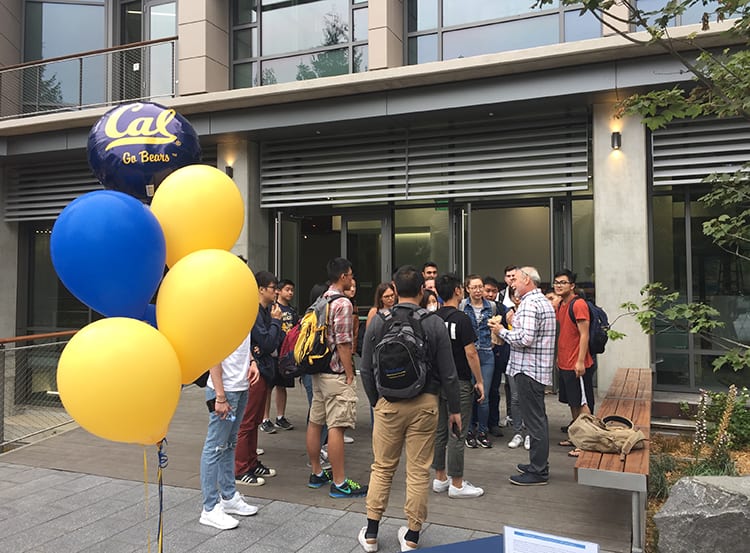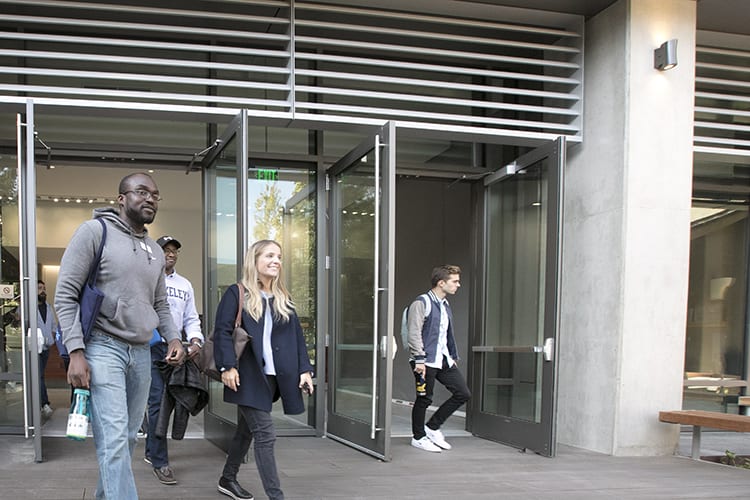
Toting a water bottle and reusable coffee mug, America Gonzalez, MBA 19, said she felt right at home in Connie & Kevin Chou Hall during her orientation week. When a class facilitator asked her to speak up, she simply tapped the glowing green microphone on her desk and her voice was amplified.
“I absolutely love the building. It’s super-modern, and it allowed for all of us to not be easily distracted by the environment,” Gonzalez said. “It really helped us and fostered a good learning environment.”
Going for greenest
More than a decade in the works, Connie & Kevin Chou Hall has opened to students—who are already taking advantage of the state-of-the art space designed solely for class work, group work, and interaction. The 80,000-square-foot structure is not only decked out with the latest classroom technology and flexible learning spaces, but is also on track to be the country’s greenest academic building.
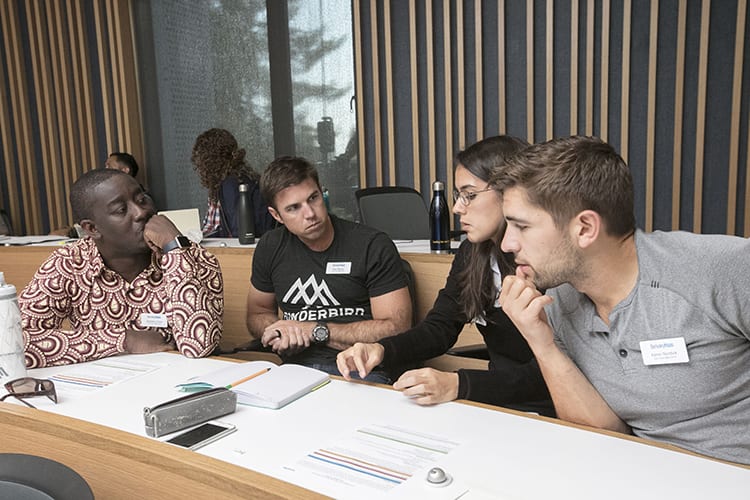 “We’re so proud of this beautiful new building and we’re incredibly grateful to the many generous donors who believed in it and made it possible,” said Dean Rich Lyons. “It’s an exciting time to add this new kind of space for our faculty to teach and students to learn in new ways. It will transform the educational experience for generations to come.”
“We’re so proud of this beautiful new building and we’re incredibly grateful to the many generous donors who believed in it and made it possible,” said Dean Rich Lyons. “It’s an exciting time to add this new kind of space for our faculty to teach and students to learn in new ways. It will transform the educational experience for generations to come.”
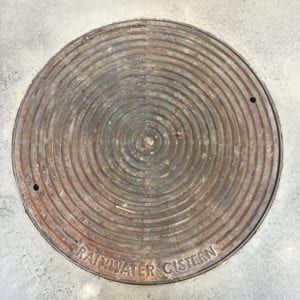
Named for Kevin Chou, BS 02 and founding CEO of mobile gaming company Kabam, and his wife, Dr. Connie Chen, the $60 million building was funded entirely by community donations. Features such as efficient heating, cooling, and lighting systems, rainwater cisterns, and 24,300 square feet of exterior windows make it the first academic building in the US designed for LEED Platinum certification and WELL certification (given to buildings that promote user health and well-being).
Pack it in, pack it out
Chou Hall will also lead the way on waste reduction—hence the requisite reusable mugs and water bottles, which can be replenished at filling stations. Compost and recycling bins will be located on each floor but landfill bins are noticeably absent. The goal is to divert 90 percent of waste and achieve zero waste certification by summer 2018, becoming the first business school in the country to do so.
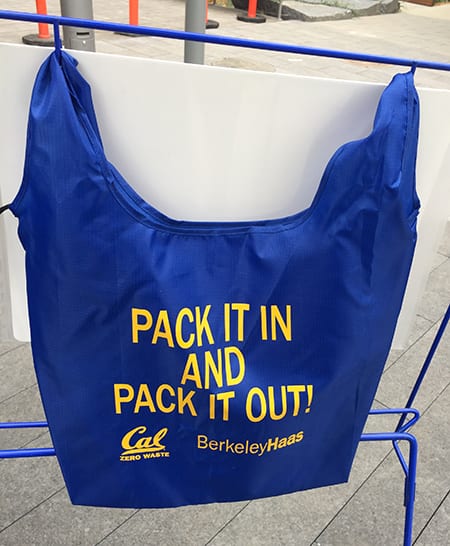
“We’re asking everyone to adopt a ‘pack-it-in, pack-it-out’ mentality,” said Courtney Chandler, senior assistant dean and chief strategy and operations officer. “It might take a little getting used to, but we don’t think it will be hard for the Haas community—we’re all about questioning the status quo and redefining business-as-usual.”
Indeed, students seemed more excited than inconvenienced on the first day of fall semester classes today.
“It’s definitely worth it in the long run,” said new Haas undergrad Alicia Lin, BS 19, while snacking on free muffins in Chou Hall lobby lounge chairs with classmate Tony Choi. ”It’s one thing to say you believe in being environmentally friendly, but it’s another thing to really get it going.”
Students were offered some incentives to pave the way.
“Instead of just saying it’s a zero waste building, they gave us water bottles during orientation,” Choi said. “It’s great that we have all this technology and can also be so green.”
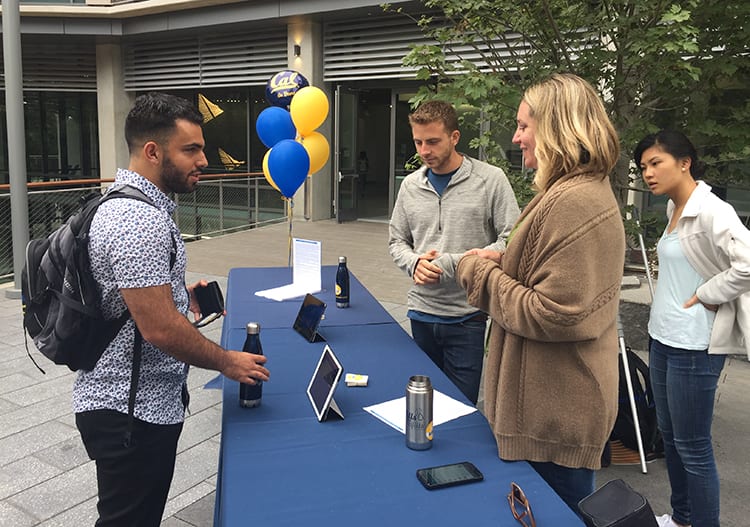
Student-led effort
The zero-waste program is a joint effort of graduate and undergrad students from Haas and the College of Natural Resources, along with the staff-led Haas Green Team and several faculty champions.
Ryan Peterson, a 2nd-year master of development practice student, and Green Team Co-chair Danner Doud-Martin, assistant director of the Berkeley-Haas International Business Development Program, spent the morning handing out information and signing students up to win a bike raffle and a FIFO@Haas cafe gift card.
“The fact that it’s a business school taking the lead on this, both within UC Berkeley and across the country, is pretty exciting,” Peterson said.
Doud-Martin said the group is putting together a manual with best practices for use across campus and elsewhere. It’s a step toward the University of California’s goal of zero waste by 2020 and carbon neutrality by 2025.
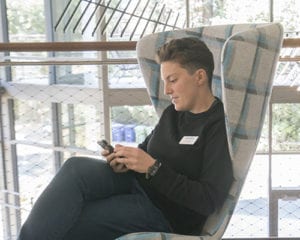
Room to breathe
Chou Hall brings much-needed space to Berkeley-Haas, which has doubled in size since the first three buildings opened in 1995. It includes eight tiered classrooms and four flexible classrooms for a total of 858 new classroom seats, as well as 28 student and meeting rooms. The 6th floor Spieker Forum event space will open in September, and a cafe serving sustainable, locally sourced food will open in early 2018.
It will also allow Haas to bring in more students. This year, the full-time MBA class was able to grow from about 250 to 284 students, and will expand to 300 next fall.
“That will bring us up to the average size within the Top 10 MBA programs,” said Pete Johnson, assistant dean of the Full-time MBA Program and Admissions.
Like the original Haas campus, Chou Hall was 100 percent funded by alumni and friends. In addition to the Chous’ gift of up to $25 million—the largest-ever from a Berkeley alum under age 40—key donations from Ned Spieker, BS 66, and four other founding donors helped bring it to fruition. Hundreds of others—such as 231 Deloitte employees who raised over $3 million since 2004—rounded out the financing.
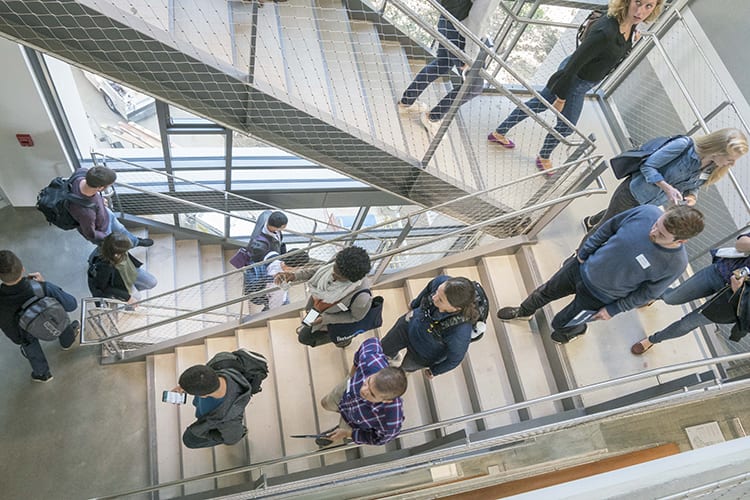
It was worth the wait, said Finance Lecturer Stephen Etter, who taught his first class in Chou Hall Wednesday and held informal office hours with students in the courtyard afterwards.
“It was all great. The A.V., the sound, and especially the eyes of the students,” Etter said. “When I looked into their eyes, I saw a glow of enthusiasm and intellectual excitement. And of course they adapted immediately to the technology.”
